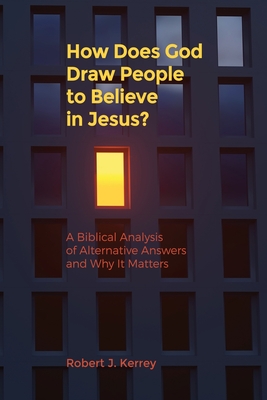How Does God Draw People To Believe In Jesus?: A Biblical Analysis of Alternative Answers and Why It Matters

How Does God Draw People To Believe In Jesus?: A Biblical Analysis of Alternative Answers and Why It Matters
For centuries, theologians have wrangled over precisely what the Bible teaches about the role of the Holy Spirit in drawing people to faith in Christ. At issue is just what is the meaning of John 6:44: "No one can come to me unless the Father who sent me draws him." Since the time of the Reformation, theologians have posited different "logical orders," (ordo salutis), for repentance, faith, regeneration, conversion, justification, sanctification, etc. At the heart of this debate is whether faith precedes regeneration or whether regeneration precedes faith.
The debate breaks down roughly along the lines of a Calvinist (Reformed) view vs. an Arminian (non-Calvinist) view, with most Calvinists asserting regeneration precedes faith and all non-Calvinists, including Arminians, asserting faith precedes regeneration. Then there are issues as to the meaning of "precedes" in these debates. Are we talking about temporal order, logical order, or both?
Additionally, informing how one approaches this topic are the anthropological and hamartiological questions swirling around the nature and description of human depravity brought about by Adam's sin. Does the theological notion of "total depravity" include or exclude human ability to respond to the gospel offer? Is regeneration a purely monergistic act or synergistic in nature? Do humans possess some form of libertarian freedom or not? What is the nature of saving faith?
Kerrey's work is groundbreaking in that he deftly navigates the choppy theological waters and proffers something of a via media for our consideration. Methodologically, Kerrey engages in an exegesis of all the key texts impinging on the question. He lists and discusses all the arguments in favor of the two major positions and then seeks to construct from Scripture a better alternative that best harmonizes all the biblical data.
The topic could not be more important. This work is a significant advance in the seeming stalemate between competing views. Kudos to Dr. Kerrey for forging a well-constructed, biblical path forward.
--David L. Allen, PhD
Dean of the School of Preaching
Southwestern Baptist Theological Seminary
PRP: 148.72 Lei
Acesta este Prețul Recomandat de Producător. Prețul de vânzare al produsului este afișat mai jos.
133.85Lei
133.85Lei
148.72 LeiLivrare in 2-4 saptamani
Descrierea produsului
For centuries, theologians have wrangled over precisely what the Bible teaches about the role of the Holy Spirit in drawing people to faith in Christ. At issue is just what is the meaning of John 6:44: "No one can come to me unless the Father who sent me draws him." Since the time of the Reformation, theologians have posited different "logical orders," (ordo salutis), for repentance, faith, regeneration, conversion, justification, sanctification, etc. At the heart of this debate is whether faith precedes regeneration or whether regeneration precedes faith.
The debate breaks down roughly along the lines of a Calvinist (Reformed) view vs. an Arminian (non-Calvinist) view, with most Calvinists asserting regeneration precedes faith and all non-Calvinists, including Arminians, asserting faith precedes regeneration. Then there are issues as to the meaning of "precedes" in these debates. Are we talking about temporal order, logical order, or both?
Additionally, informing how one approaches this topic are the anthropological and hamartiological questions swirling around the nature and description of human depravity brought about by Adam's sin. Does the theological notion of "total depravity" include or exclude human ability to respond to the gospel offer? Is regeneration a purely monergistic act or synergistic in nature? Do humans possess some form of libertarian freedom or not? What is the nature of saving faith?
Kerrey's work is groundbreaking in that he deftly navigates the choppy theological waters and proffers something of a via media for our consideration. Methodologically, Kerrey engages in an exegesis of all the key texts impinging on the question. He lists and discusses all the arguments in favor of the two major positions and then seeks to construct from Scripture a better alternative that best harmonizes all the biblical data.
The topic could not be more important. This work is a significant advance in the seeming stalemate between competing views. Kudos to Dr. Kerrey for forging a well-constructed, biblical path forward.
--David L. Allen, PhD
Dean of the School of Preaching
Southwestern Baptist Theological Seminary
Detaliile produsului










